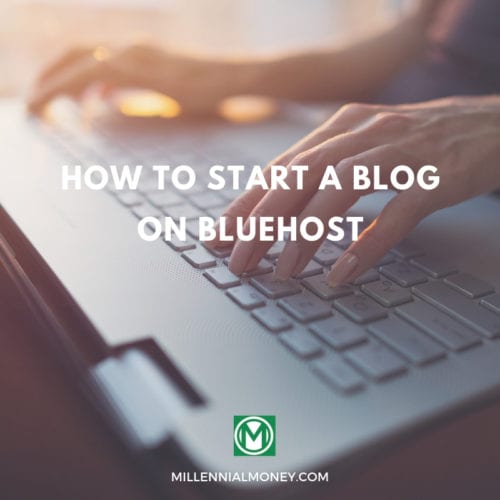Picture this – it’s Sunday night, and you’re planning dinner for the week. You want to plan out some healthy meals to feed your family, so you Google “healthy dinner recipes.”
Immediately, you spot a website with an article titled “Healthy Recipes to Feed a Family of Four.” You click on it, read the article, and begin to surf the site for more recipes. You find that the webpage is run by a young woman who is a full-time blogger and cooking enthusiast.
What does that mean? Full-time blogger? How does she make money? What is a blog?
In today’s day in age, blogging is a perfectly legitimate way to earn a full-time or part-time salary. Plenty of people use their writing skills and specific interests to curate a blog and earn income. However, many people still fail to understand what a blog is and how it differs from a website.
In this post, we’ll explain what a blog is, the history of the blog, what a blog can be used for, and how to start a blog yourself. Let’s dive right in.
What Is A Blog?
The standard definition for a blog is a website or web page that is regularly updated for either personal use or for business use. Now, this is a pretty cut and dry definition and may not give you clarity on what a blog is. Simply, blogs are websites whose content is meant to be informational or instructive by nature. It also typically focuses on a specific topic.
For example, our website is a financial blog. We regularly post content about personal finance, investing, company reviews, and more. All of our posts are tied together by the theme of money. In theory, we could post content about the best restaurants to visit in Seattle, but that would likely confuse our audience and detract from our existing content.
Blogs can be used for personal or public use, so the blogger can decide who can view their blog and its content. A personal blog is a site that is password protected and can only be accessed by people that are approved by the blogger. A public blog is a site that can be accessed by anyone and everyone. These are the sites that are used to create revenue and often earn a dedicated following.
Blogs also have content that comes from a single author. Every post on a blog usually comes from one person who curates, creates, produces, and promotes all the content on the site. This is why blogging is a legitimate career choice for many people. You are often doing the work of entire marketing, sales, and production departments all by yourself. Obviously, some larger blogs may employ some writers or photographers to help create content, but there is often a single face associated with the blog and brand.
History Of The Blog
The internet has a vast and fascinating, if brief, history. For something so young, it has created a remarkable impact on our society, economy, and culture. Blogging is one of the most significant changes to the internet landscape. But where did it all start?
In 1994, Justin Hall, a Swarthmore College student at the time, created the world’s first-known blog, Links.net. However, it wasn’t a blog as we know it today. It was simply a personal webpage.
The term ‘weblog’ was coined in 1997 by Jorn Barger. He referred to his process of logging the web as weblogging. Pretty axiomatic. This was then shortened in 1999 to blog by Peter Merholz, a programmer.
Blogs were originally very simple, personal websites that people used to share information or opinions about a variety of topics. These blogs were posted in reverse chronological order, which means that the most recent post will appear first on the webpage. This is true of most blogs today as well.
Website vs. Blog
If you’ve ever heard the statement “all squares are rectangles,” then you can think of the relationship between blogs and websites in a similar way. All blogs are websites, but not all websites are blogs.
Unlike a website, a blog is updated consistently with posts that can include text, pictures, videos, GIFs, and more. While a website may update small bits of information on their site semi-regularly, a blog habitually (monthly, weekly, daily) creates new content that is relevant to their audience. In short, a blog isn’t successful unless new posts are added regularly.
People often mistake a company’s blog for their website when, in fact, it is merely a section of their overall website. While the website informs potential and existing customers about relatively unwavering aspects of the business (About Us and company history,) a blog is a more informative section of the website that is dedicated to teaching people about aspects of the industry, profiling prominent employees, and more.
A dedicated blog, such as a food or travel blog, is a website that is entirely devoted to entertaining, informing, or persuading an audience. It will post dedicated articles, known as blog posts, about a certain subject that is relevant to the overall theme of the blog.
What Is A Blog Post?
A blog post is to a blog what an article is to a newspaper. It is an individual webpage that talks about a specific subtopic of the blog.
To tie back to our original example of the food blog, the page “Healthy Recipes to Feed a Family of Four” is a blog post on the overall blog. It relates to the theme of the blog, which is food, but it also specifically addresses a subtopic of the blog, which is feeding a family of four.
Blog posts rank on the search engine results based on keywords. If you want your blog post to rank on Google based on the keywords ‘healthy dinner recipes,’ you will need to optimize the post based on search engine algorithms, a process known as search engine optimization or SEO.
SEO is the hidden key to creating a successful blog and monetizing it.
What is Blogging?
Blogging is the verb form of Blog. Meaning it is the act of maintaining and adding to a blog. A blog owner is “blogging” when they create new content, implement new monetization, practice SEO on their content, or promote their content on social networks.
What is a Blogger?
A Blogger is an individual who owns or controls the blog. They share their opinions on certain topics in a niche to attract a target audience to their blog.
What Is a Blog Used For?
When it comes to what a blog is used for, the sky is the limit. You can do whatever you want with it.
If you want to create a digital journal, you can use a personal blog to keep track of the major events in your life. If you want to share a specific interest with the world, you can create a public blog that teaches people a skill and connect with like-minded people. Blogs can even be used to earn revenue, but ultimately, this looks different depending on who is behind the creation of the blog.
A blog can be started by an individual or a business entity. If an individual wants to start a blog, it doesn’t have to serve a larger company and can instead be used to build a personal brand. If you are a skilled writer and knowledgeable in SEO best practices, blogging can even be your full-time job.
Here are some of the major reasons that people start blogs:
1 – To Share Your Knowledge About A Topic With The World
One of the main reasons that people start blogs is to share a passion with the world. Whether it’s knitting, cooking, travel, exercise, fashion, or any number of things, blogging is a great way to channel your knowledge on a subject in a way that engages others. This is also how many people begin a career in blogging.
Many people start off by creating a public blog about a certain topic, such as cooking. They create aesthetically- pleasing webpages, informative posts, and shareable content. By being consistent and on-topic, their blog can attract visitors and even business partners. Eventually, this is how one can become known as an expert in a subject and spread its influence far and wide.
If you are interested in how you can earn a living from a blog, be sure to check out our separate post on how to make money blogging.
2 – To Help Your Company Rank On Search Engines
Everybody knows that word of mouth is the best marketing. But in the age of the internet, many people turn to Google or other search engines to find great businesses near them. That’s why many companies are prioritizing SEO through blogging as a means of getting their name out there.
Search engine optimization is when websites use search engine analytics to their advantage in order for their site to rank favorably. Blogging is an excellent way to do this because it draws traffic to your site and helps you rank higher on search engines. Many company sites use paid ads and other methods to help rank on Google, but blogging is a great way to create consistent traffic.
If a business starts a blog, they are typically writing about topics that would be useful to their clients or customers. They are often informative in nature, but their knowledge works to persuade a customer to purchase a product from them by building credibility.
Blogging won’t yield immediate results in boosting SEO rankings. Like most things, it will take time and consistency for your blog to gain web traffic and boost Google rankings. If your company decides to make a concerted effort to creating regular, high-quality blog posts, this will help your company website improve traffic and hopefully gain customers.
3 – To Attract Site Visitors And Use Those Visitors As Leads
A business website is, frankly, not a super interesting site. You will only get so much web traffic from an “About Us” page, and good SEO rankings are determined by overall traffic on your site. Blogs are a tool by which a business can draw visitors to their site and use their engagement to determine their audience’s interests.
Blogs are often very underutilized tools for commercial enterprises. For a business, blogs can help create an online presence, establish yourself as an industry expert, and attract more leads, clients, or customers.
For instance, if a certain blog posts gets a lot of interaction, this means that this is a topic that interests your audience. A business can use this information to create new products or service offerings and capture their client’s attention. They can also create a dedicated audience from the content they create and use this audience as leads for business.
4 – To Cultivate A Community Online And Engage With Like-Minded People
People are meeting each other more frequently online these days. Blogs are a great way to bring attention to causes, hobbies, sports, and anything else that has a dedicated following.
If you are interested in meeting people who are passionate about the same things as you are, you may consider starting a blog in an effort to connect with people like you.
What Types of Blogs Are There?
There are innumerable blog subjects out there, but most blogs fall into one of these four categories:
- Lifestyle/Personal brand blog
- Passion subject blog
- Broad niche blog
- Crash-test-dummy blog
1 – Lifestyle Blog
A lifestyle or personal brand blog is a blog that is run by a single person that blogs about various areas of their life that they are passionate about. For example, a lifestyle blogger may choose to blog about fashion, health and wellness, interior design, and fitness. These are each different subjects, but they can create a well-rounded blog when they are united under a single person’s brand.
2 – Passion Blog
A passion subject blog would focus on a single topic rather than multiple. A knitting blogger would choose to create and promote content focused solely on knitting, and a cycling blogger would focus solely on bicycling, trail guides, and other related content. Passion subject blogs are limited in scope, but they can still be vastly interesting and informative.
3 – Broad Niche
A broad niche blog would be a blog that focuses on a larger category, such as fitness or DIY. Our blog, for example, is a broad niche blog because it focuses on the overarching subject of finance. We cover a variety of topics that pertain to finance, investing, managing personal wealth, and more. This type of blog requires a lot of content creation, but it also means that you’ll never get bored.
4 – Crash-Test-Dummy Bl0g
Remember the documentary “Super-Size Me?” If this man had decided to create a blog instead of a movie documenting his journey, this would be an example of a crash-test-dummy blog. A crash-test-dummy blog is a blog that documents an individual’s journey as they conduct an experiment on themselves. You could choose to document your weight loss journey, the evolution of your cooking skills, and more. As long as you’re creating chronological documentation of a journey, this is a crash-test-dummy blog.
How Do I Start a Blog?
Have you become inspired to start a blog? That’s great! You may be a bit puzzled about where to start. After creating a domain, here are some steps to get you on the path to becoming a blogger.
Choose a Topic or Audience
Before you go through the process of purchasing a domain and creating a website, you need to decide what you want to blog about. This is perhaps one of the most exciting parts of blogging.
A good blog will have a dedicated topic or audience. All you need to decide is what you want to talk about and what makes you tick. Do you love food and cooking? Maybe you should start a foodie blog. Perhaps you want to target parents and talk about parenting methods that have worked for you? Then a parenting blog might be the best choice for you.
Whatever you choose, make sure that it is broad enough that you can create consistent content about it. In theory, you could start a blog about the best restaurants in Wheeling, WY, but you may find yourself running out of content after a while.
Create New Content Regularly Based on Your Blog’s Focus
In order to fill out your blog, you will need to create content on a regular basis. This is the most time-consuming task of running a blog and is one of the most difficult. You will need to brainstorm ideas for posts and consider what is of interest to your target audience.
One of the best ways to come up with content ideas is to research similar blogs. What are they posting about? What are some of their most popular posts? Are there gaps in their content strategy that you could fill with your own content? These are the questions to ask yourself as you scour the marketplace.
It’s also a good idea to have blogs and bloggers that inspire you. Understanding what people have done right can help inform your decisions and help you become a better blogger. Definitely do not plagiarize anyone’s work, but you can see what other people are talking about to let you know what your audience is interested in.
Build An Editorial Calendar and Content Strategy
As we’ve said before, a blog doesn’t work unless you post to it regularly. The best way to maintain blog activity is to create an editorial calendar and content strategy.
An editorial calendar is a calendar that lets you know what you are going to post and when you will post it. This can help you maintain a regular posting schedule and give your audience a clear idea of when to expect new content. There are certain content management systems that can help you schedule your posts on social media and on your site so that you can set up content ahead of time.
Additionally, you will need to create a content strategy for your blog. A content strategy sets a clear mission, vision, and goal for the posts that you create for your site. Your strategy should inform you about the specific posts that you should work on and who you should target with each post. This is also something that you can keep in mind when researching fellow bloggers in your field.
Market and Promote Your Blog
Now that you’ve got your blog up and running, it’s time to let the world know. Use your social media channels to promote your blog, or perhaps create new social media channels that post on behalf of your blog.
Take part in social media Q&A’s, interact with popular blogger’s posts, follow people that fall within your target audience, and more. There are plenty of ways to bring awareness to your blog and make your voice heard.
Become an Expert In SEO
Search engine optimization is the best way to make sure that your blog posts get traffic. After all, you’re doing all this so that people read your work. Luckily, there are plenty of resources on the internet to help you learn about SEO best strategies.
One of the best places to start when it comes to SEO is in your posts themselves. Set keywords for your posts and make sure that your writing speaks to those keywords. Add videos, pictures, and links throughout your post. Experiment with article structure and length. Eventually, you will find the secret sauce that your audience responds to.
There are several WordPress plugins that you can use to monitor your post’s SEO to make sure that your posts are performing as they should. Pay attention to these, and optimizing your posts will begin to feel like second nature.
Review and Repurpose Old Content
Once you’ve written something, make sure it doesn’t get buried in all your new content. Make sure you include a plan to revisit old content in your content strategy. Update information in the post, add new subsections, link it into new articles, and make the post feel brand new again. This will help boost the post’s SEO performance and drive the SEO performance of your site as a whole.
Is Blogging For You?
Blogging is a legitimate career path and can be a lucrative venture. Like many things, it takes practice and patience before you start to see success.
Make sure you do your research before you embark on your blogging journey. Having a clear and organized plan will do wonders when you begin to create content and push your blog’s name out.
Happy blogging!




Read 1 comment or add your own
Read Comments